DNP's Main Initiatives
Here we introduce DNP's social contribution activities for continuing to be a good corporate citizen.

Scope
Environmental Conservation
Activity theme: With love for nature
Conservation of biodiversity
DNP receives numerous benefits from ecosystems that are supported by rich biodiversity and believes that maintaining harmonious coexistence with the environment is essential for sustainable growth as a company. In keeping with this belief, through its main business activities DNP is working to conserve biodiversity such as in procuring raw materials while creating green areas at business sites.
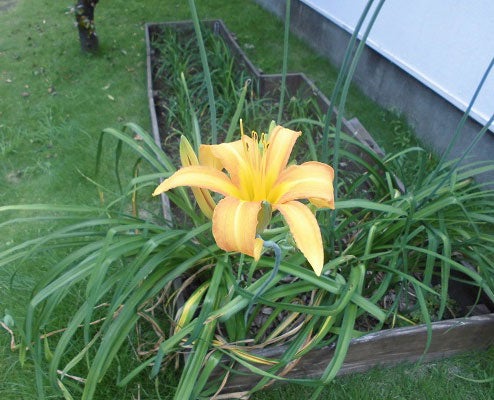 DNP is promoting ex situ conservation by utilizing the green space on the premises of DNP Technopack's Yokohama Plant.
DNP is promoting ex situ conservation by utilizing the green space on the premises of DNP Technopack's Yokohama Plant.
Cleanup Activities
As part of our efforts to protect the natural environment, we promote local cleanup activities at each of our group's offices nationwide. These activities are led by the labor union and involve many employees every year.
In fiscal 2024, approximately 850 people (employees and their family members) participated in local clean-up activities at over 14 business locations across the country.
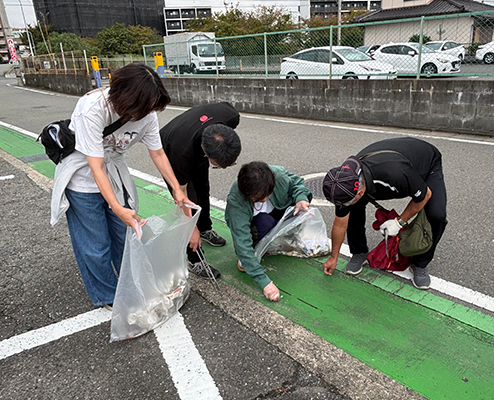 Activities in the West Japan region, with approximately 150 participants, including family members
Activities in the West Japan region, with approximately 150 participants, including family members

Scope
Community and International Engagement
Activity theme: With a broad outlook
Fairtrade Activities
Fairtrade activities aim to improve the living conditions and self-independence of vulnerable producers and workers in developing countries by continuously and stably trading raw materials and products at a fair price. The DNP Group has worked to spread the Fairtrade activities since the inception of these activities in Japan. They include promoting the in-house consumption of Fairtrade-certified coffee, which reached one million cups in March 2018. In recognition of these achievements, DNP was presented with the first-ever certificate of commendation in Japan from Fairtrade Label Japan, a specified NPO.
In fiscal year 2024, we sold 2,506 cafeteria meals using Fairtrade certified organic ginger powder and 151,297 cups of fair trade certified coffee.
また、2024年8月には、 「フェアトレード・ワークプレイス ゴールド」企業として上記団体より承認されました。これは、社内で年間を通じて継続的に国際フェアトレード認証製品を提供または使用し、調達量が指定の数量基準を超えて生産者へのインパクトを創出した企業に対して認められるものです。
 Fairtrade-certified coffee is served to guests.
Fairtrade-certified coffee is served to guests.
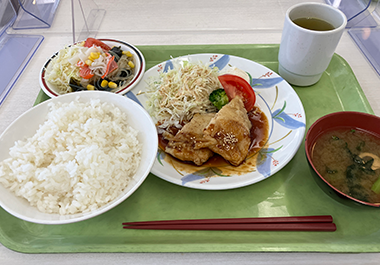 During Fairtrade Month in May, we offer a menu item that uses certified products.
During Fairtrade Month in May, we offer a menu item that uses certified products.
Support for women and children in developing countries and conflict areas(donation of unneeded goods)
In collaboration with the Japanese Organization for International Cooperation in Family Planning (JOICFP) and Japan International Volunteer Center (JVC), NGO for international cooperation, every year we donate stamps (used and unused), postcards (miswritten and unused), CDs and DVDs to support safe and secure childbirth and children's education activities in disaster-stricken areas in Asia, Africa and Japan. Numerous employees participate each year as a project enabling the participation of Group employees throughout Japan.
In fiscal 2024, we donated unused stamps and postcards worth 56,000 yen (face value), approximately 2.4 kg of used stamps, and 114 CDs/DVDs.
*Total since 2018: Approximately 560,000 yen worth of unused stamps and postcards, approximately 44.4 kg of used stamps, 652 CDs/DVDs
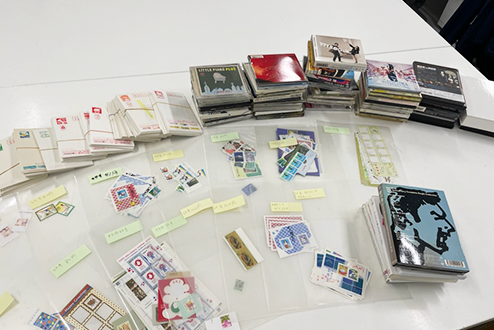 Stamps and postcards received from the business divisions across the country
Stamps and postcards received from the business divisions across the country
Local community contribution activities
DNP Group's overseas subsidiaries undertake a variety of local community contribution activities.
Through Karawang International Industrial City Community Association we belong to and with the support of IPB University, DNP Indonesia has been participating in Telaga Desa Agro-Enviro Education Park, a local community contribution program involving technical guidance and technology transfer in the agriculture, fisheries, livestock and forestry industries, since the program's inception, as it continuously provides support over the long term. These efforts are aimed at improving the productivity of neighboring communities whose main industry is agriculture and helping build self-reliant societies.
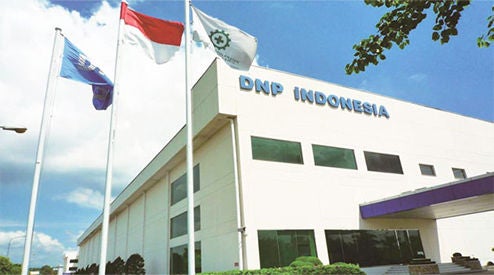 DNP Indonesia's Karawang Plant
DNP Indonesia's Karawang Plant

Scope
Future Generations Development
Activity theme | For the next generation
Visiting classes and workshops
Driven by its desire to contribute to the sustainable development of society by providing children, who will lead the next generation, with workshops that stimulate their intellectual curiosity, increase interest in learning and raise interest in social issues, DNP visits local elementary schools to present its visiting classes and holds workshops for children throughout the country.
In 2024, 1,213 people took the course at six schools and educational facilities in Tokyo, Osaka, and Sapporo.
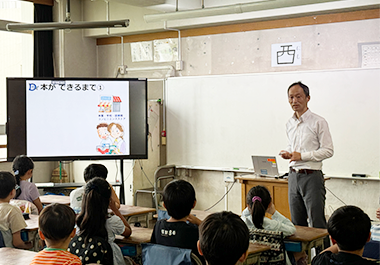 A visiting class held in the Shinjuku area of Tokyo
A visiting class held in the Shinjuku area of Tokyo
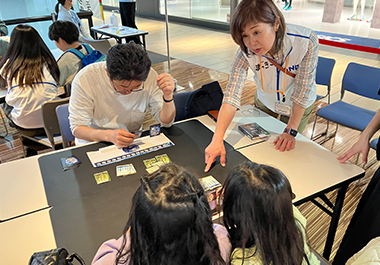 A workshop featuring "MyEarth" environmental education card game, held at Osaka Knowledge Capital
A workshop featuring "MyEarth" environmental education card game, held at Osaka Knowledge Capital
Educational support for developing countries (volunteer activity to prepare translated picture books)
Many children around the world have never even seen a picture book due to conflict, poverty or other factor. Based on a desire to help boost the literacy rate of children in developing countries by providing them with the opportunity to access books, which are closely related to publishing and printing, DNP participates in the Campaign to Deliver Picture Books. The campaign, run by the non-governmental organization Shanti Volunteer Association (SVA), sends Japanese picture books, affixed with seals bearing translations into the local language, to children in developing countries.
We have donated a cumulative total of 693 books through 2023. *Not yet implemented in fiscal year 2024.
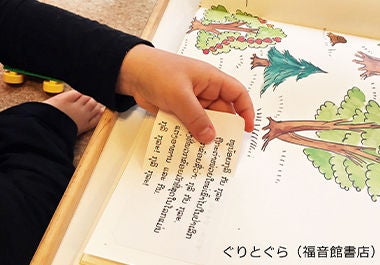 Every year numerous employees and their children participate in the event.
Every year numerous employees and their children participate in the event.
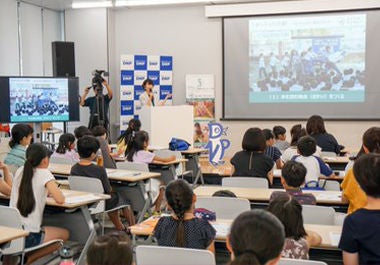 DNP held workshops together with SVA and also encouraged the participation of people from outside the company.
DNP held workshops together with SVA and also encouraged the participation of people from outside the company.
Company visits and plant tours
At nationwide business sites, DNP accepts local elementary and junior high school students for company visits and plant tours with the aim of helping them develop their careers by introducing DNP's businesses and the work of its employees and teaching children and students about engagement with society, job satisfaction and the importance of hard work for realizing their dreams.
In 2024, we welcomed a total of 219 students from three elementary schools (162 students), eight junior high schools (43 students), and three high schools (14 students).
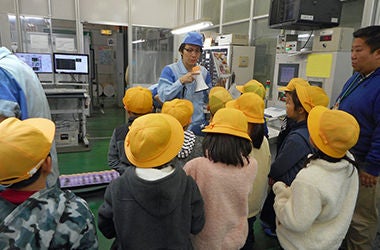 Elementary school students on a plant social studies tour
Elementary school students on a plant social studies tour
 Junior high school students wear work uniforms and experience workplaces.
Junior high school students wear work uniforms and experience workplaces.
Support for business education for high school students
In recent years, “enhancing career education” has become a key theme in school education. Students are provided with opportunities to learn about careers through work experience at companies and various organizations and via dialogue with actual employees and staff. DNP participates in the Tokyo Metropolitan government's Commercial Education Consortium Tokyo and provides business education to high schools.
In 2024, 175 students from Tokyo Metropolitan Third Commercial High School took the course.
*Total since 2018: 1,225 students
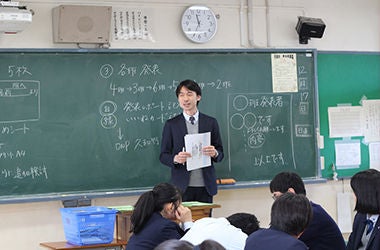 An expert from DNP’s planning visits the school to give a lesson.
An expert from DNP’s planning visits the school to give a lesson.
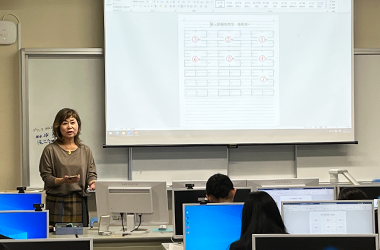 A business idea class at Tokyo Metropolitan Third Commercial High School
A business idea class at Tokyo Metropolitan Third Commercial High School

Scope
Promoting Art and Culture
Activity theme: To enhance social well-being
Art and culture are prerequisites for the advancement of social well-being capable of bringing happiness and inspiration into people’s lives. As a printing enterprise, the DNP Group supports advancement of the arts and culture in the field of graphic arts and through the use of printing technology to preserve and disseminate historic cultural properties and images.

Scope
Humanitarian Aid
Activity theme: Also taking a Humanitarian standpoint
DNP's Recovery and Reconstruction Support for Areas Affected by the 2024 Noto Peninsula Earthquake
In response to the 2024 Noto Peninsula Earthquake, which occurred mainly in the Noto region of Ishikawa Prefecture on January 1, 2024, the DNP Group donated 10 million yen on January 11 of the same year. In addition, together with DNP Group employees, we conducted fundraising activities at each workplace and employee cafeteria, and donated 9.14 million yen on March 26. All donations were made to Japan Platform (JPF), a specified non-profit organization that provides emergency support for disaster recovery and reconstruction. Additionally, the employee cafeteria served 2,967 Recovery Support Menu meals, with a portion of the sales price set aside for donations, raising 148,350 yen. Furthermore, in July and November 2024, a total of 41 employees participated in volunteer activities in Nanao City and Wajima City.
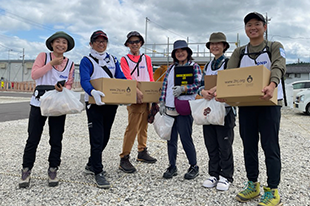 Distributing relief supplies at temporary housing in Nanao City
Distributing relief supplies at temporary housing in Nanao City
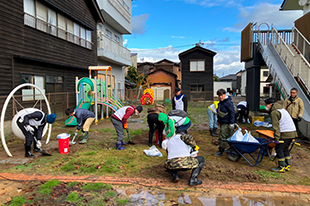 Clearing mud from a kindergarten playground in Wajima City
Clearing mud from a kindergarten playground in Wajima City
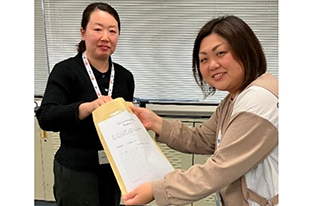 Fundraising activities at each workplace
Fundraising activities at each workplace
 Recovery support menu served in the employee cafeteria
Recovery support menu served in the employee cafeteria
Disaster reconstruction support (donations)
DNP has formulated DNP Group Criteria for Conducting Disaster Recovery and Reconstruction Support and provides emergency support according to these criteria in response to large-scale disasters that occur in Japan and overseas. Specifically, DNP contributes support money and implements employee fundraising and support programs, making donations as support for disaster areas. Additionally, DNP provides continuous support for reconstruction for disasters in Japan that cause enormous damage.
For example, with the support program “D-Smile Menu,” we offer a special “reconstruction support menu” at the company cafeterias nationwide, the price of which includes a donation. In case of a large-scale disaster, DNP donates a portion of the proceeds from this menu to organizations conducting support activities. Moreover, the menu is served throughout the year and changes monthly, allowing for donations to initiatives to eliminate educational inequality across Japan. These monthly menus also facilitate economic support of previously supported disaster areas as we procure ingredients from there. Starting in fiscal 2022, the program was expanded to “menus for building a better society” to include menu items that support activities that defend human rights. (See section “Refugee support (donations)”)
[D-Smile Menu FY2024 Support Results]
・Educational disparity elimination activities: 1,919,250 yen (38,385 meals) [Support recipients] Chance for Children (Public Interest Incorporated Association), Asunoba (Public Interest Incorporated Foundation), Shinjuku Ward Shinjuku Special Needs School
Food bank support: 83,550 yen (1,671 meals) [Support recipient] National Food Bank Promotion Council
 An example of the “reconstruction support menu” for the Great East Japan Earthquake
An example of the “reconstruction support menu” for the Great East Japan Earthquake
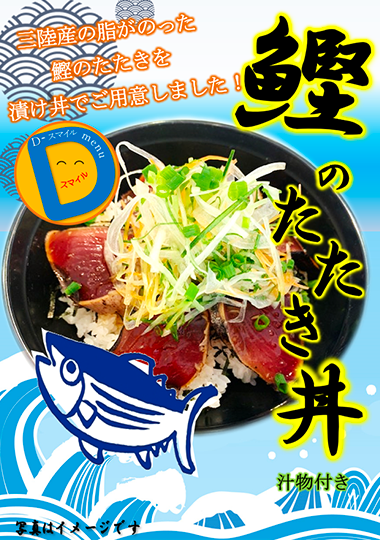 One of the menu items related to areas affected by the Great East Japan Earthquake
One of the menu items related to areas affected by the Great East Japan Earthquake
Disaster reconstruction support (local volunteers)
As a good corporate citizen that coexists with society, DNP believes it has a mission to provide support for large-scale disasters that occur in Japan and overseas. As a way of support, we believe it is important to have the attitude and feeling of “get close to the hearts of the people affected by the disaster and sincerely consider how we can support them.” Accordingly, DNP strived to collaborate closely with NPOs and other organizations deeply familiar with existing conditions in the disaster-stricken areas while continuing to undertake reconstruction support activities that match the needs and circumstances of the disaster-stricken areas.
In 2024, a total of 41 employees participated in volunteer activities to support reconstruction efforts in July and November in Nanao City, Ishikawa Prefecture, and other areas affected by the 2024 Noto Peninsula Earthquake.
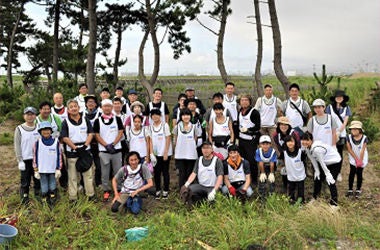 Much is learned in the areas stricken by the Great East Japan Earthquake
Much is learned in the areas stricken by the Great East Japan Earthquake
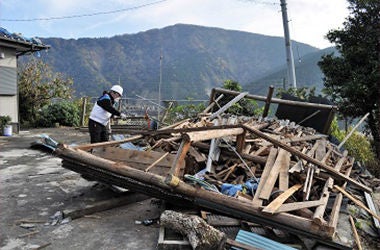 We dismantled and sorted out the debris of a hut completely destroyed by the 2016 Kumamoto Earthquakes
We dismantled and sorted out the debris of a hut completely destroyed by the 2016 Kumamoto Earthquakes
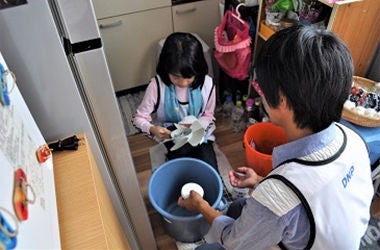 Employees and their families cleaning temporary housing after the 2018 West Japan Torrential Rains
Employees and their families cleaning temporary housing after the 2018 West Japan Torrential Rains
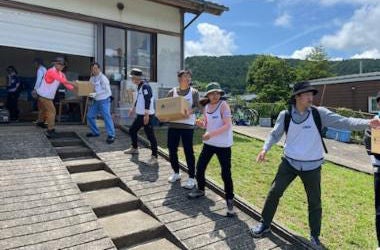 Employees' on-site volunteer activities in response to the 2024 Noto Peninsula Earthquake
Employees' on-site volunteer activities in response to the 2024 Noto Peninsula Earthquake
Refugee support (donations)
Wanting to continuously support refugees, said to number more than 110 million worldwide (May 2024, United Nations High Commissioner for Refugees [UNHCR]), DNP decided to donate a total of 50 million yen, spread out over five years as 10 million annually starting in 2022, to Japan for UNHCR. The donations from DNP go toward the UNHCR’s activities to help refugees.
Additionally, we promote long-term refugee support throughout the year, for example by serving “support menus” that included donations from employees at our employee cafeterias nationwide during World Refugee Day (June 20) and Human Rights Week (December 4-10).
[D-Smile Menu FY2024 Support Results]
・Refugee support: 202,500 yen (corresponding to 4,050 dishes) [Beneficiaries] United Nations High Commissioner for Refugees (UNHCR) / Japan for UNHCR
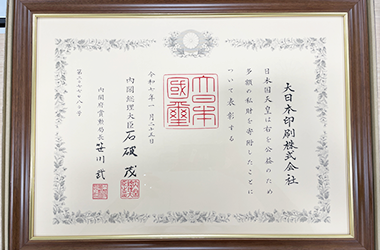 Certificate of the Dark Blue Ribbon Medal of Honor
Certificate of the Dark Blue Ribbon Medal of Honor
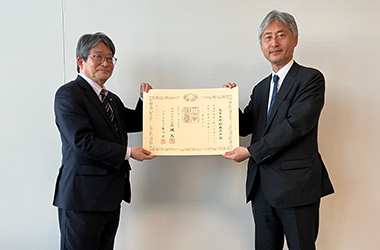 Presentation of the medal (at DNP Ichigaya-Kagacho Bldg.. From left: Kazuhiko Sugita, DNP Senior Managing Director, Masayuki Kawai, Secretary General of the Japan Association for UNHCR)
Presentation of the medal (at DNP Ichigaya-Kagacho Bldg.. From left: Kazuhiko Sugita, DNP Senior Managing Director, Masayuki Kawai, Secretary General of the Japan Association for UNHCR)
Total amount of donations to nonprofit organizations and community investments, and major recipients
(FY2024) 959 million yen
<Major donation recipients>
- DNP Foundation for Cultural Promotion, a public interest incorporated foundation
- United Nations UNHCR Association, a specified nonprofit corporation
- Japan Productivity Center (Japan Akademeia), a public interest incorporated foundation
- Japan Cancer Research Foundation, a public interest incorporated foundation
